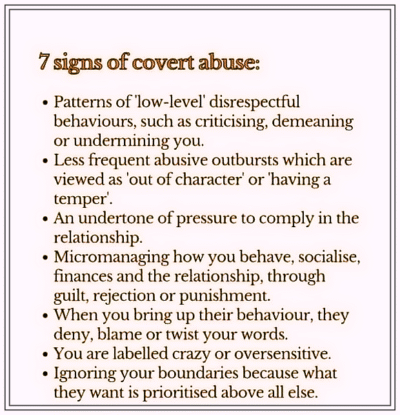Covert abuse is abuse that hides in plain sight. It’s harm done in ways that are subtle, disguised, or easily denied, making it harder for the victim—
Covert abuse is abuse that hides in plain sight. It’s harm done in ways that are subtle, disguised, or easily denied, making it harder for the victim—and often outsiders—to recognize it as abuse.
for the victim—and often outsiders—to recognize it as abuse.
Unlike overt abuse, which is loud and obvious (like shouting, hitting, or name-calling), covert abuse operates quietly and often appears “reasonable” or even “caring” on the surface.
Common Traits of Covert Abuse
Manipulation through kindness → Using charm, gifts, or attention as a cover for control.
Gaslighting → Making you doubt your memory, perceptions, or sanity.
Silent treatment → Withholding communication as punishment.
Sarcasm & “jokes” → Cutting remarks disguised as humor.
Backhanded compliments → Subtle digs framed as praise.
Undermining → Quietly sabotaging your confidence, relationships, or reputation.
Feigning ignorance → Pretending not to understand requests or needs as a way to avoid responsibility.
Why It’s So Harmful
It creates self-doubt, making you feel like you’re “overreacting.”
It’s easy for outsiders to miss, leaving the victim isolated.
It often escalates over time, normalizing disrespect and control.
Survivor Insight 🌹
For Survivors, covert abuse can feel even more damaging because it erodes trust in your own instincts. The abuser’s subtle tactics train you to question yourself before you ever question them. That’s why naming it is powerful—it brings light to what was meant to stay hidden.